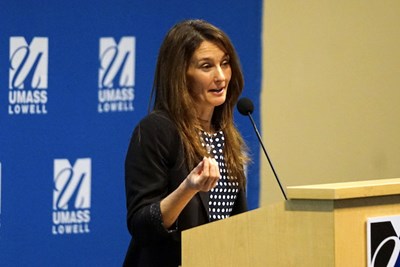UML recognized for wellness initiatives
New Office of Student Life and Well-Being builds on No. 1 Sustainable Campus Index ranking
.jpeg)
What do well-being and work have to do with sustainability?
Quite a bit, according to the Association for the Advancement of Sustainability in Higher Education (AASHE). The nonprofit organization includes “well-being and work” among 17 categories that it uses to evaluate nearly 700 colleges and universities around the world in its annual Sustainable Campus Index.
And for two years running, UMass Lowell has ranked No. 1 in the category of well-being and work, which recognizes student and employee wellness programs, as well as employee compensation, satisfaction, health and safety.
According to Ruairi O’Mahony, executive director of UML’s Rist Institute for Sustainability and Energy, the ranking reflects the university’s commitment to helping students, faculty and staff achieve a healthy work-life balance.
“You can have the greenest campus in the world, but if the people who work and learn there don’t enjoy a good life outside the campus, what does it matter?” says O’Mahony, who points to things like UML’s Healthy Workplace Initiative and Live in Lowell program as key factors in the top ranking.
“It’s the people at UMass Lowell who drive the sustainability program, which is something that Chancellor (Jacquie) Moloney has always recognized,” he says.
Proactive Approach
To bolster its efforts, UMass Lowell created the Office of Student Life and Well-being last year. Under the direction of Ruben Sanca ’09, ’11, the office’s mission is to foster student success by integrating eight dimensions of wellness: emotional, environmental, financial, intellectual, physical, social, spiritual and vocational.
.jpeg)
While the university already has a wide range of services in place to address these areas — from the Wellness Center and Campus Recreation to Career Services and Student Activities and Leadership — Sanca says the new office will conduct annual assessments to provide a “50,000-foot view” of students’ evolving needs.
“We’re looking at how we can support the initiatives we already have on campus and then fill in the gaps by adding new programs based on our assessments,” says Sanca, who has spent the past few months learning how universities such as MIT and Wake Forest address student well-being.
He notes that schools across the country, UML included, have ramped up resources over the past decade to address students’ mental health — an issue magnified by the COVID-19 pandemic.
“A lot of those efforts have been more reactive,” he says. “Now, schools are trying to take more of a proactive approach by creating a campus culture of well-being.”
The new office is already collaborating with Student Activities to create community service and engagement programs that can help students feel more connected to their environment, which “can trigger improvement in how they see their purpose on campus,” Sanca says.

The office is working with the Zuckerberg College of Health Sciences to give students opportunities to conduct research on the community initiatives as part of their curriculum, Sanca says. The office also plans to work with the Manning School of Business to expand financial literacy courses for all students.
“There are win-win situations for all of us if we work together,” says Sanca, whose office will share its assessment data and resources with faculty and staff from each college.
“The student population changes over time, every couple of years is different than the past, and we have to be able to communicate that with our faculty and staff. They’re the main point of contact with students,” he says.
While the new office, which falls under the Division of Academic and Student Affairs, focuses on student well-being, Sanca would like to see its scope eventually expand to include employees, too.
“As faculty and staff members, we have to feel that culture of well-being within ourselves so we can better provide that for our students,” he says.
Real-world Reverberations
Well-being isn’t just gaining traction on college campuses; the companies where students will one day work are also embracing the concept, according to Assoc. Prof. of Management Erica Steckler.
“Well-being is very much on the public’s mind, especially given the pandemic, and businesses are realizing that there’s substantial value in really advancing well-being as a foundational identity of an organization,” says Steckler, who researches humanistic management, which “focuses on the protection of dignity and promotion of well-being.”

Steckler says organizations are spending “more time, effort, care and resources on ensuring the well-being of stakeholders, whether that’s the people who work for them or the people who are purchasing goods or services from them.”
As someone who also researches organizational authenticity, Steckler says it’s important for businesses to back up their words with actions.
“It’s promising when organizations are putting a stake in the ground and saying, ‘We care about well-being, and we’re making commitments to ensure that it’s something that we practice,” she says.
Stecker, who is co-director of the Donahue Center for Business Ethics and Social Responsibility, says she’s “proud” to work at a university that’s committed to ensuring the well-being of all its people.
“It’s important not only that the university is focusing on student well-being, but also that well-being is something that’s considered across the various dimensions of the organization,” she says.